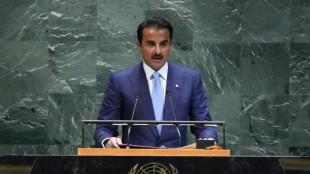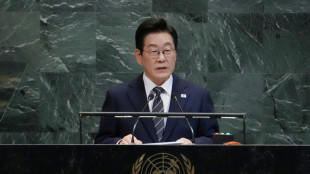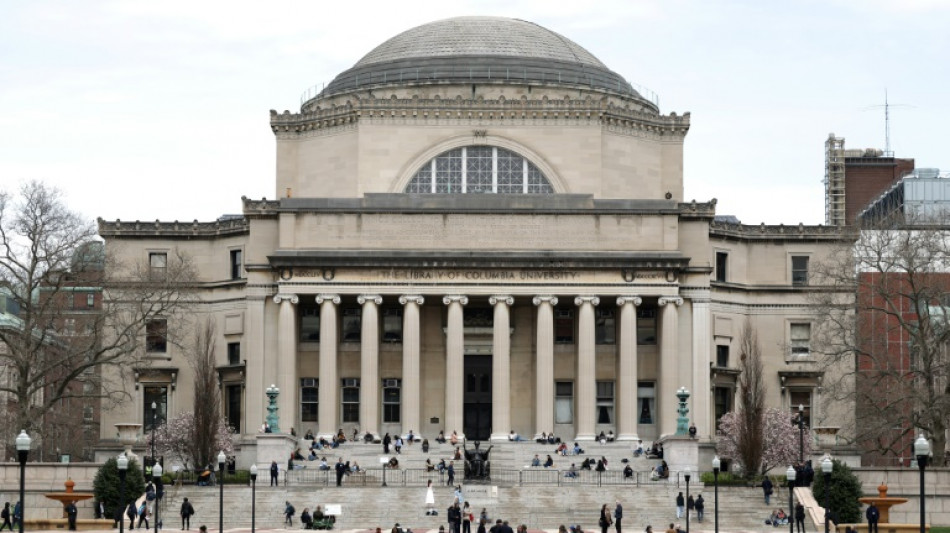
-
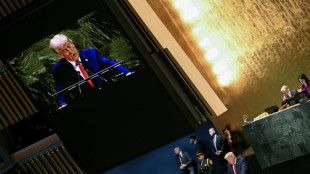 'Greatest con job ever': Trump trashes climate science at UN
'Greatest con job ever': Trump trashes climate science at UN
-
Schools shut, flights axed as Typhoon Ragasa nears Hong Kong, south China

-
 Celtics star Tatum doesn't rule out playing this NBA season
Celtics star Tatum doesn't rule out playing this NBA season
-
Trump says NATO nations should shoot down Russian jets breaching airspace
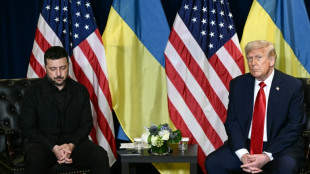
-
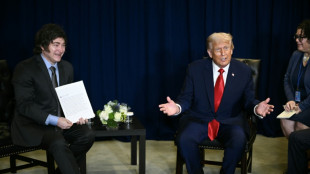 Trump says at Milei talks that Argentina does not 'need' bailout
Trump says at Milei talks that Argentina does not 'need' bailout
-
Iran meets Europeans but no sign of sanctions breakthrough

-
 NBA icon Jordan's insights help Europe's Donald at Ryder Cup
NBA icon Jordan's insights help Europe's Donald at Ryder Cup
-
Powell warns of inflation risks if US Fed cuts rates 'too aggressively'
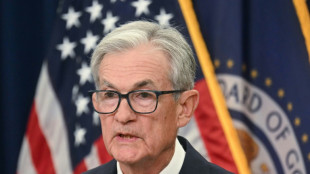
-
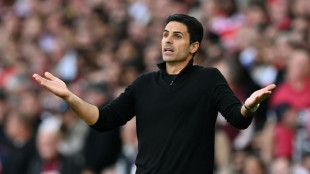 Arteta slams 'handbrake' criticism as Arsenal boss defends tactics
Arteta slams 'handbrake' criticism as Arsenal boss defends tactics
-
Jimmy Kimmel back on the air, but faces partial boycott
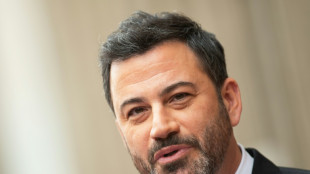
-
 Triumphant Kenyan athletes receive raucous welcome home from Tokyo worlds
Triumphant Kenyan athletes receive raucous welcome home from Tokyo worlds
-
NASA says on track to send astronauts around the Moon in 2026

-
 Stokes 'on track' for Ashes as England name squad
Stokes 'on track' for Ashes as England name squad
-
Djokovic to play Shanghai Masters in October

-
 In US Ryder Cup pay spat, Schauffele and Cantlay giving all to charity
In US Ryder Cup pay spat, Schauffele and Cantlay giving all to charity
-
Congo's Nobel winner Mukwege pins hopes on new film
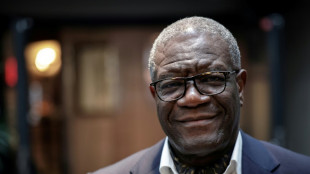
-
 Scheffler expects Trump visit to boost USA at Ryder Cup
Scheffler expects Trump visit to boost USA at Ryder Cup
-
Top Madrid museum opens Gaza photo exhibition
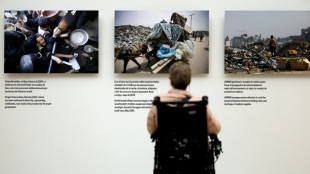
-
 Frank unfazed by trophy expectations at Spurs
Frank unfazed by trophy expectations at Spurs
-
US says dismantled telecoms shutdown threat during UN summit

-
 Turkey facing worst drought in over 50 years
Turkey facing worst drought in over 50 years
-
Cities face risk of water shortages in coming decades: study

-
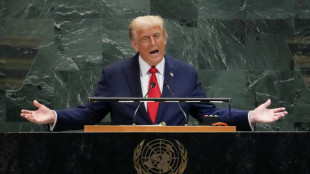 Trump mocks UN on peace and migration in blistering return
Trump mocks UN on peace and migration in blistering return
-
Stokes named as England captain for Ashes tour

-
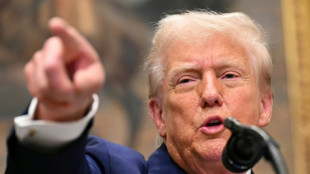 Does taking paracetamol while pregnant cause autism? No, experts say
Does taking paracetamol while pregnant cause autism? No, experts say
-
We can build fighter jet without Germany: France's Dassault

-
 Atletico owners negotiating with US firm Apollo over majority stake sale - reports
Atletico owners negotiating with US firm Apollo over majority stake sale - reports
-
Stocks mark time with eyes on key economic data

-
 Tabilo stuns Musetti for Chengdu title, Bublik wins in Hangzhou
Tabilo stuns Musetti for Chengdu title, Bublik wins in Hangzhou
-
Trump returns to UN to attack 'globalist' agenda

-
 No.1 Scheffler plays down great expectations at Ryder Cup
No.1 Scheffler plays down great expectations at Ryder Cup
-
WHO sees no autism links to Tylenol, vaccines
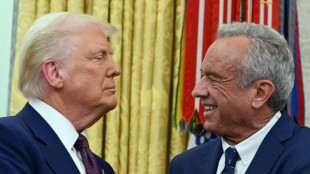
-
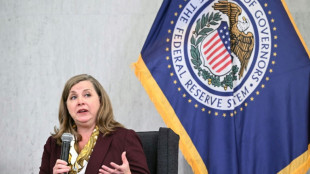 US Fed official urges proactive approach on rates to boost jobs market
US Fed official urges proactive approach on rates to boost jobs market
-
Nearly 100 buffaloes die in Namibia stampede

-
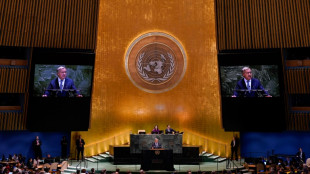 UN chief warns 'aid cuts are wreaking havoc' amid slashed budgets
UN chief warns 'aid cuts are wreaking havoc' amid slashed budgets
-
Schools shut, flights axed as Typhoon Ragasa nears Hong Kong, southern China

-
 Hundreds trapped as typhoon triggers barrier lake burst in Taiwan
Hundreds trapped as typhoon triggers barrier lake burst in Taiwan
-
EU proposes new delay to anti-deforestation rules

-
 Man City have 'recovered many things': Guardiola
Man City have 'recovered many things': Guardiola
-
Thailand to 'clarify misunderstandings' after SEA Games petanque ban

-
 Denmark brands mystery drone flights 'serious' attack
Denmark brands mystery drone flights 'serious' attack
-
Iran executed at least 1,000 this year in prison 'mass killing': NGO
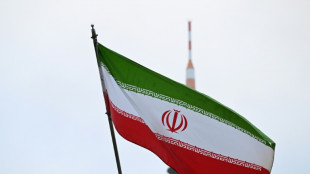
-
 France's Dassault says can build European fighter jet without Germany
France's Dassault says can build European fighter jet without Germany
-
Former umpire 'Dickie' Bird dies aged 92

-
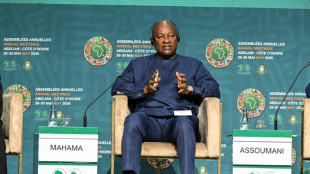 Ghana deports at least six west Africans expelled by US to Togo
Ghana deports at least six west Africans expelled by US to Togo
-
Bradley admits thoughts linger about having played in Ryder Cup

-
 EU queries Apple, Google, Microsoft over financial scams
EU queries Apple, Google, Microsoft over financial scams
-
OECD raises world growth outlook as tariffs contained, for now

-
 Former umpire Harold 'Dickie' Bird dies aged 92
Former umpire Harold 'Dickie' Bird dies aged 92
-
Cycling worlds bring pride to African riders despite disadvantages

| RYCEF | 0.63% | 15.75 | $ | |
| CMSC | -0.46% | 24.14 | $ | |
| BCC | -0.56% | 79 | $ | |
| RBGPF | 0% | 76.6 | $ | |
| NGG | 0.37% | 71.22 | $ | |
| GSK | -0.68% | 40.635 | $ | |
| SCS | -0.09% | 16.885 | $ | |
| VOD | -0.24% | 11.363 | $ | |
| JRI | 0.32% | 14.045 | $ | |
| BTI | -1.18% | 53.24 | $ | |
| RIO | -0.41% | 63.39 | $ | |
| BCE | 0.99% | 23.3 | $ | |
| CMSD | -0.72% | 24.284 | $ | |
| AZN | -1.94% | 76.025 | $ | |
| BP | 1.33% | 34.835 | $ | |
| RELX | -1.47% | 46.4 | $ |

Academics warn Columbia University deal sets dangerous precedent
Columbia University's $200 million agreement with President Donald Trump's administration marks the end of a months-long showdown, but academics warn it is just the first round of a government "assault" on higher education.
Academics from Columbia and beyond have expressed concerns that the deal -- which makes broad-ranging concessions and increases government oversight -- will become the blueprint for how Trump brings other universities to heel.
The New York institution was the first to be targeted in Trump's war against elite universities, for what the US president claimed was its failure to tackle anti-Semitism on campus in the wake of pro-Palestinian protests.
It was stripped of hundreds of millions of dollars of federal funding and lost its ability to apply for new research grants. Labs saw vital funding frozen, and dozens of researchers were laid off.
But Columbia last week agreed to pay the government $200 million, and an additional $21 million to settle an investigation into anti-Semitism.
According to Ted Mitchell, president of the American Council on Education, the lack of due process -- with the government slashing funding before carrying out a formal investigation -- left Columbia in an "untenable position."
Columbia law professor David Pozen agreed, saying the "manner in which the deal was constructed has been unlawful and coercive from the start" and slamming the agreement as giving "legal form to an extortion scheme."
- Federal oversight -
The deal goes beyond addressing anti-Semitism and makes concessions on international student admissions, race and ethnicity considerations in admissions and single-sex spaces on campus, among other issues.
Columbia also agreed to appoint an independent monitor to implement the deal, share ethnicity admissions data with the government and crack down on campus protests.
Many of the provisions "represent significant incursions onto Columbia's autonomy," said Pozen.
"What's happened at Columbia is part of a broader authoritarian attack on civil society," he said, pointing to similar pressures on law firms and media organizations to fall in line.
According to the law professor, the deal "signals the emergence of a new regulatory regime in which the Trump administration will periodically and unpredictably shake down other schools and demand concessions from them."
In the coming weeks, Pozen said he expected the "administration will put a lot of pressure on Harvard and other schools to follow suit."
Harvard University has pushed back against the government, filing a lawsuit in a bid to reverse sweeping funding cuts.
But Steven Levitsky, a professor of government at Harvard, said that "in terms of academic freedom and in terms of democracy, the (Columbia) precedent is devastating."
- 'First round' -
Education Secretary Linda McMahon said she hoped the Columbia deal would be a "template for other universities around the country."
On Wednesday, McMahon announced a deal with Brown University to restore some federal funding and end ongoing investigations after the Ivy League school agreed to end race considerations in admissions and adopt a biological definition of gender.
Brown President Christina Paxson admitted "there are other aspects of the agreement that were not part of previous federal reviews of Brown policies" but were "priorities of the federal administration."
Harvard is reportedly considering forking out $500 million to settle, according to the New York Times.
Others have made smaller concessions to appease the government, with Trump's alma mater the University of Pennsylvania banning transgender women from competing in women's sports, and the University of Virginia's head resigning after scrutiny over its diversity programs.
Brendan Cantwell, a professor at Michigan State University who researches the history and governance of higher education, said government interference in universities "has not happened at scale like this, probably ever in American history."
While some university staff see striking an agreement as the quickest way to reopen the federal funding spigot, Cantwell warned that concessions such as sharing ethnicity data from admissions could be "weaponized" and provide fodder for future probes.
Levitsky agreed, saying: "Extortionists don't stop at the first concession. Extortionists come back for more."
"There's a very high likelihood that this is just the first round," he said.
Pozen noted that it will be harder for "major research universities to hold the line" compared to smaller colleges which are less reliant on federal funding.
But Levitsky still urged Harvard to stand its ground and "fight back," including in the courts.
"Fighting an authoritarian regime is costly, but that's what we have to do," he said. "This is an unprecedented assault, and universities need to work together."
P.Silva--AMWN
